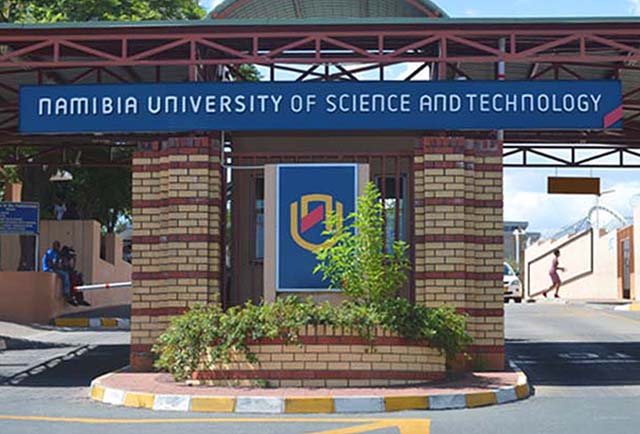THE Namibia University of Science and Technology is in a dire financial situation requiring an urgent response.
A strategic financial plan report by the university’s deputy vice chancellor for administration and finance, Mamijoo Tjejamba, dated 30 September this year, shows that the university is going through an unstable period financially because of significant budgetary cuts and unpaid tuition fees.
The Ministry of Finance allocated N$504 million to the Namibia University of Science and Technology (Nust) in the 2020/21 budget, which converts to an average financing of N$42 million per month to the institution in public funds.
However, Nust also has unpaid commitments from last year, a monthly wage bill of N$55 million and a nearly completed post-graduate centre with an average monthly operating expenditure of N$20 million.
According to Tjejamba, the university will record an operating deficit of N$172 million during the current financial year, before considering spending on movable assets and capital projects.
“The outbreak of Covid-19 and the subsequent shutdown of all academic activities […] resulted in a significant adjustment of the academic calendar and related activities,” Tjejamba said in the report.
Tjejamba also said because of cash flow problems, the university paid its employees late for three months while service providers were not paid when their accounts were due.
The revenue from tuition will be negatively affected following the Covid-19 pandemic because of its impact on the economy both locally and internationally, Tjejamba said.
She said the total revenue is just enough to cover the salary bill of the university’s 457 full-time administrative workforce, leaving a mere N$35 million to cover the operational and capital expenditure.
“This is a clear indication of how desperate the university’s liquidity position for the strategic period is and will be,” she said.
She added “the salary bill remains alarmingly high, now at 95% of the total revenue during the base year. The university should urgently implement strategies to reduce this expenditure to an acceptable industry level”.
Tjejamba suggests a scenario to help put an end to the ongoing financial difficulty. This includes senior staff going on early retirement, limiting recruitment to essential academic positions with a net reduction of support or administrative staff.
The university also wishes to reduce the staff numbers to 409 by 2020 by not filling 43 positions that will become vacant due to retirement and contracts ending.
University council minutes from a meeting on 4 August show that the university has an overdraft of N$100 million with First National Bank Namibia.
The minutes also show that a N$42 million subsidy from the government was received on 17 July while the institution’s bank account was overdrawn by N$48 million.
“Currently, the university has no reserves to operate on, and many obligations remain unpaid,” according to the report.
In July this year, executive director in the ministry of higher education Alfred van Kent met with Nust’s bursar and officials from First National Bank to discuss the financial position of the institution and its overdraft with the bank.
At the meeting, the minutes show that Van Kent wanted to know from the bank officials the maximum amount allowed for the overdraft and FNB Namibia responded that it can consider up to a limit of N$50 million and that FNB South Africa should be consulted if the amount is more than that.
“A concern was expressed by some members that the submission is not clear on how the N$100 million will be repaid and it is also a concern from the bank’s side on how the institution will repay the bank if the institution is only getting N$42 million per month,” the minutes show.
The council suggests that Nust negotiate with the government to provide it with a subsidy that should be sufficient to pay the salaries of the university staff and make the other payments from other incomes.
The university has a loan of N$40 million for the completion of its postgraduate centre and a parking garage project.
The minutes show that for the current financial year, the government provided N$6 million of the budget for capital projects, which includes the construction of the building that requires an estimated N$40 million to be completed.
Van Kent told The Namibian on Thursday that he ensured Nust’s issue with the bank was resolved. “In addition, in order to enhance the liquidity of the institution, I further made an arrangement with the Namibia Students Financial Assistance Fund to pay all the outstanding tuition fees of Nust and this was done and Nust has confirmed receiving all monies,” he said.
Nust acting vice chancellor Andrew Niikondo could not comment on the matter yesterday, saying he was driving from the north.
Higher education minister Itah Kandjii-Murangi last week said she is aware of the difficult financial situation Nust is in. The minister added that economic difficulties are not only being experienced by public institutions, but the government and companies contributing to the education of many students are also experiencing financial challenges.
She added that “it is not possible at this point in time to speculate how much the institution is going to receive during the mid-budget review. It is our hope though that treasury will be able to meet all institutions’ funding requirements”.
Stay informed with The Namibian – your source for credible journalism. Get in-depth reporting and opinions for
only N$85 a month. Invest in journalism, invest in democracy –
Subscribe Now!






